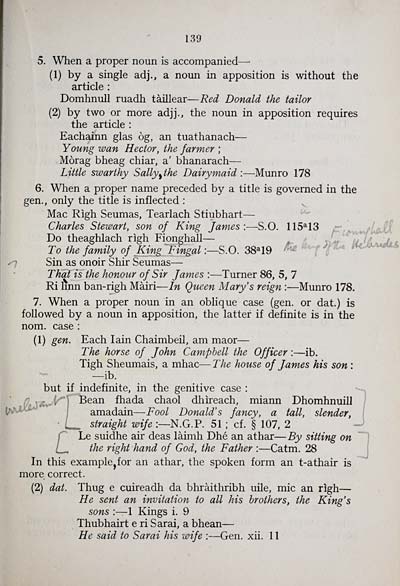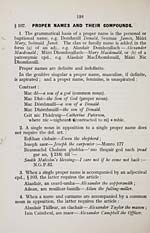Matheson Collection > Gaelic grammar, containing the parts of speech and the general principles of phonology and etymology, with a chapter on proper and place names
(159)
Download files
Complete book:
Individual page:
Thumbnail gallery: Grid view | List view

J
1
139
5. When a proper noun is accompanied — - i
(1) by a single adj., a noun in apposition is without the
article :
Domhnull ruadh tàillear — Red Donald the tailor
(2) by two or more adjj., the noun in apposition requires
the article :
Eachainn glas òg, an tuathanach — ^
Young wan Hector, the farmer ; ■
Mòrag bheag chiar, a' bhanarach —
Little swarthy Sally ^the Dairymaid : — Munro 178
6. When a proper name preceded by a title is governed in the
gen., only the title is inflected :
Mac Righ Seumas, Tearlach Stiubhart — '''-' \
Charles Stewart, son of King James: — S.O. 115*13 C'f^^.y^/ioM '
Do theaghlach righ Fionghall — ^ ^jZ u h j..
To the family of King 'Fingal :— S.O. 38M9 '-^ f f^ ^ic^t^'u^u*
Sin as onoir Shir Seumas —
That is the honour of Sir James : — Turner 86, 5, 7
Ri Imn ban-righ Màiri — In Queen Mary's reign : — Munro 178.
7. When a proper noun in an oblique case (gen. or dat.) is !
followed by a noun in apposition, the latter if definite is in the
nom. case :
(1) gen. Each Iain Chaimbeil, am maor —
The horse of John Campbell the Officer : — ib. j
Tigh Sheumais, a mhac — The house of James his son :
— ib.
but if indefinite, in the genitive case
' f J^^^] -^^^^ fhada chaol dhireach, miann Dhomhnuill
l^^'^-*'^^ I amadain — Fool Donald's fancy, a tall, slender,
■ L straight wife :— N.G.P. 51 ; cf. § 107, 2
L
Le suidhe air deas làimh Dhè an athar — By sitting on
the right hand of God, the Father : — Catm. 28
In this example^for an athar, the spoken form an t-athair is
more correct.
(2) dat. Thug e cuireadh da bhràithribh uile, mic an righ —
He sent an invitation to all his brothers, the King's
sons : — 1 Kings i. 9
Thubhairt e ri Sarai, a bhean —
He said to Sarai his wife : — Gen. xii. 1 1
1
139
5. When a proper noun is accompanied — - i
(1) by a single adj., a noun in apposition is without the
article :
Domhnull ruadh tàillear — Red Donald the tailor
(2) by two or more adjj., the noun in apposition requires
the article :
Eachainn glas òg, an tuathanach — ^
Young wan Hector, the farmer ; ■
Mòrag bheag chiar, a' bhanarach —
Little swarthy Sally ^the Dairymaid : — Munro 178
6. When a proper name preceded by a title is governed in the
gen., only the title is inflected :
Mac Righ Seumas, Tearlach Stiubhart — '''-' \
Charles Stewart, son of King James: — S.O. 115*13 C'f^^.y^/ioM '
Do theaghlach righ Fionghall — ^ ^jZ u h j..
To the family of King 'Fingal :— S.O. 38M9 '-^ f f^ ^ic^t^'u^u*
Sin as onoir Shir Seumas —
That is the honour of Sir James : — Turner 86, 5, 7
Ri Imn ban-righ Màiri — In Queen Mary's reign : — Munro 178.
7. When a proper noun in an oblique case (gen. or dat.) is !
followed by a noun in apposition, the latter if definite is in the
nom. case :
(1) gen. Each Iain Chaimbeil, am maor —
The horse of John Campbell the Officer : — ib. j
Tigh Sheumais, a mhac — The house of James his son :
— ib.
but if indefinite, in the genitive case
' f J^^^] -^^^^ fhada chaol dhireach, miann Dhomhnuill
l^^'^-*'^^ I amadain — Fool Donald's fancy, a tall, slender,
■ L straight wife :— N.G.P. 51 ; cf. § 107, 2
L
Le suidhe air deas làimh Dhè an athar — By sitting on
the right hand of God, the Father : — Catm. 28
In this example^for an athar, the spoken form an t-athair is
more correct.
(2) dat. Thug e cuireadh da bhràithribh uile, mic an righ —
He sent an invitation to all his brothers, the King's
sons : — 1 Kings i. 9
Thubhairt e ri Sarai, a bhean —
He said to Sarai his wife : — Gen. xii. 1 1
Set display mode to: Large image | Transcription
Images and transcriptions on this page, including medium image downloads, may be used under the Creative Commons Attribution 4.0 International Licence unless otherwise stated. ![]()
| Permanent URL | https://digital.nls.uk/76601930 |
|---|
| Description | Items from a collection of 170 volumes relating to Gaelic matters. Mainly philological works in the Celtic and some non-Celtic languages. Some books extensively annotated by Angus Matheson, the first Professor of Celtic at Glasgow University. |
|---|
| Description | Selected items from five 'Special and Named Printed Collections'. Includes books in Gaelic and other Celtic languages, works about the Gaels, their languages, literature, culture and history. |
|---|

